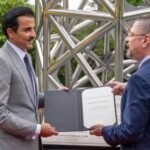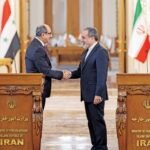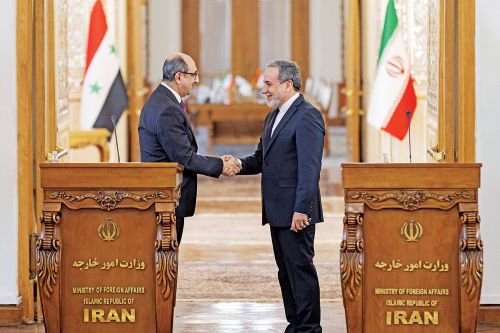
BY MOHAMMAD TARIQUE SALEEM
Iran’s Foreign Minister Abbas Araghchi has reaffirmed the nation’s steadfast support for Syria, emphasizing their commitment to deepening bilateral cooperation across various fields. During a joint press conference in Tehran with Syrian Foreign Minister Bassam Sabbagh, Araghchi praised Syria’s stability and unity while condemning attempts to destabilize the region. The discussions covered a broad spectrum of topics, including the war in Gaza, tensions in Lebanon, and the enduring “strategic and solid” partnership between the two nations.
Araghchi denounced Israel’s repeated aggressions against Syria and Lebanon, underscoring the hostile nature of the Zionist regime. He called on the international community and the United Nations to hold Israel accountable for its expansionist policies and criticized their prolonged inaction. Highlighting Iran’s firm stance, he declared that any act of hostility against Iranian territory would not go unanswered, asserting Tehran’s right to defend its sovereignty.
Iran’s response to aggression, Araghchi noted, is marked by careful deliberation and strategic insight. “We respond at the appropriate time, making decisions with wisdom rather than emotion,” he stated. His remarks reiterated Iran’s commitment to measured and effective strategies in navigating regional challenges.
The failure of the U.S. “maximum pressure” policy against Iran also came under scrutiny. Araghchi contrasted this with Iran’s “maximum resistance” approach, which has bolstered the country’s resilience. He urged the U.S. to shift to “maximum rationality,” suggesting that diplomacy and reason would yield more constructive outcomes than coercive tactics.
Sabbagh echoed Araghchi’s sentiments, attributing the escalating tensions in the region to a joint American and Zionist agenda aimed at reshaping West Asia’s geopolitical landscape. He accused Israel of attempting to destabilize Syria by keeping it preoccupied with internal conflicts and maintaining a presence of terrorist groups in northern Syria. However, he reaffirmed Syria’s determination to resist these efforts and continue its fight against terrorism.
Bilateral cooperation emerged as a central theme in the discussions, with both ministers highlighting the importance of economic collaboration in countering Western sanctions. The Joint Economic Commission’s upcoming meetings in Damascus aim to strengthen mechanisms that mitigate the sanctions’ harmful effects. Sabbagh expressed satisfaction with the existing partnership but acknowledged the need for deeper coordination to confront shared challenges.
The ministers condemned Israel’s actions in Palestine, Lebanon, and Syria, particularly its occupation of the Golan Heights. They emphasized the necessity of holding Israel accountable for its crimes and reiterated their commitment to opposing all forms of occupation.
This enduring partnership between Iran and Syria symbolizes a strong resistance to foreign intervention and coercion. Both nations’ shared resolve to counter Israel’s aggression and external manipulation has fortified their alliance, making it a cornerstone of West Asia’s Resistance Axis.
As they navigate complex regional dynamics, Iran and Syria’s united stance sends a clear message: their commitment to sovereignty, resilience, and a just regional order remains unwavering. Their partnership serves as a model for rejecting external domination and building a future defined by mutual cooperation and resistance against oppression.










